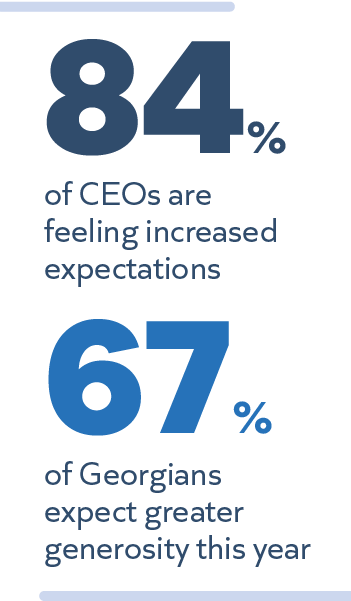Business leaders reimagine their role in caring for people and community
Over the course of this year, we’ve had the opportunity to interview several chief executives who lead teams of anywhere from 30 employees to 3,000. In each of the conversations, we’ve wrestled with the rising expectations for businesses to take a more active role in solving societal problems.
Historically, the task of solving social issues fell solely to not-for-profit and government organizations. Today, stakeholders are turning to business to drive needed changes.
Listening to fellow chief executives, this isn’t simply a trend but a momentum shift.
Responding to societal crisis is not simply a good thing to do, but a business imperative

Research conducted by goBeyondProfit earlier this year confirmed chief executives are feeling heightened expectations to be a force for good with 96% of respondents claiming they plan to maintain or increase their generous activities. The overwhelming majority consider this increased pressure a positive opportunity.
A recent CEO Daily from Fortune’s Alan Murray reinforces this notion that company values, empathetic leadership and tangible actions for the good of people, planet and purpose are increasingly central to business value.
The dialogue around business purpose, values and response accelerated thanks to the pandemic, social awareness and a rising focus on environmental sustainability. The pandemic crystallized personal struggles and social inequities causing many executives to empathize more with employees and customers. Will the moment pass? Most leaders we speak with see this as a great reset and opportunity for business to reimagine its role in caring for people and community.
What are CEOs saying?
Recently, Chloe Barzey, Managing Director, Accenture shared her perspective with us:
“This is a big change from a primary focus on shareholders in the past,” she said. “Today, the reality is that those leading companies need to demonstrate tangible value and tangible impact in their communities. For all of us, it must be more than just an announcement or public statement of support. Some companies are farther along on this journey than others.”
Chief executives like Heather Fortner, CEO, SignatureFD echoed the reality that individuals and companies are inextricably intertwined in finding the solutions.
“The real excitement lies in people using their purchasing power to hold companies accountable. This grassroots effort of collective, individual efforts can lead to exponential, even generational change. If we really want to help lift communities out of cycles of hurt and poverty it will require a coordinated effort for those of us who make up community. We need to feel accountability. And people, individual people are using their influence to hold us as corporations and leaders accountable.”
Kevin Greiner, CEO, Gas South, said:
“I’ve always seen free enterprise and business as agents for positive change. It’s a very promising trend for society, this overall movement toward more conscious capitalism. The risk is in companies riding the wave and talking about generosity without doing very much. Discerning consumers help good corporate citizens live up to their pledges.”
Enrique Alvarez, Co-Founder, Vector Logistics shared:
“Honestly, I think it’s a huge opportunity for companies to actually consider doing more, but it’s not just about generous activities from companies. Every one of us will need to wake up every day thinking about how we as individuals and companies can increase our generosity every day.”
Moving forward with confidence
Practically speaking, leaders name an increased focus on environmental, social, and governance (ESG) criteria as a means for companies to not only talk about what’s important but also show their positive impact. ESG brings the conversation into the board room driving the need to demonstrate positive impact for employees, shareholders and the communities they serve.
“This isn’t a trend, it’s a new reality”
Chloe Barzey confirmed, “once you’ve been exposed to the issues, it’s hard to go back and act like you haven’t seen or experienced them in new ways. Customers, employees, all stakeholders are demanding that companies do more as a result. For me, I hope this is not just a moment, but momentum.”
